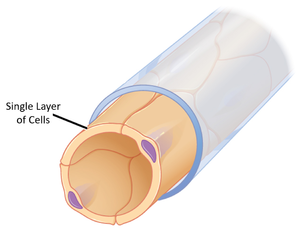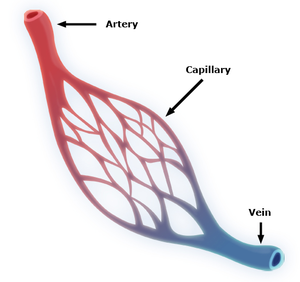Capillary
Contents
Key Stage 3
Meaning
Capillaries are very small blood vessels that spread through the organs to deliver the oxygen and nutrients to individual cells.
Key Stage 4
Meaning
Capillaries are very small blood vessels that spread through the organs to deliver the oxygen and nutrients to individual cells.
Adaptations of Capillaries
- Capillaries are just wide enough for red blood cells to pass through.
- The walls of capillaries are only one cell thick.
| A diagram of a capillary. |
About Capillaries
| A diagram showing how arteries branch out to form capillaries which then join back together to form veins. |
References
AQA
- Capillaries, page 31, GCSE Combined Science; The Revision Guide, CGP, AQA
- Capillaries, page 35, GCSE Biology; The Revision Guide, CGP, AQA
- Capillaries, page 77, GCSE Combined Science Trilogy; Biology, CGP, AQA
- Capillaries, page 83, GCSE Biology, CGP, AQA
- Capillaries, pages 30, 51, 54, GCSE Biology, Hodder, AQA
- Capillaries, pages 51, 54, GCSE Combined Science Trilogy 1, Hodder, AQA
- Capillaries, pages 54-55, 61, 182-183, GCSE Biology; Third Edition, Oxford University Press, AQA
- Capillary, pages 107, 113, GCSE Biology; Student Book, Collins, AQA
Edexcel
- Capillaries, page 112, GCSE Combined Science, Pearson Edexcel
- Capillaries, page 162, GCSE Biology, Pearson, Edexcel
- Capillaries, page 264, GCSE Biology, CGP, Edexcel
- Capillaries, page 62, GCSE Combined Science; The Revision Guide, CGP, Edexcel
- Capillaries, page 90, GCSE Biology; The Revision Guide, CGP, Edexcel

